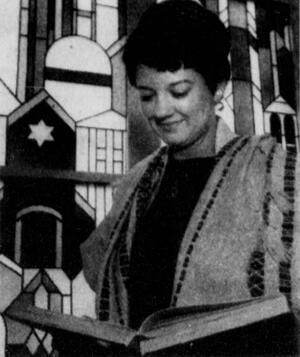Death of Cynthia Culpeper, the first pulpit rabbi to announce her AIDS diagnosis
In January 1996, Rabbi Cynthia Culpeper stood before her congregation in Montgomery, AL, and announced that she had contracted AIDS, becoming the first pulpit rabbi to disclose an AIDS diagnosis.
Culpeper was a trailblazer in more ways than one. A San Francisco native, she was raised Catholic. She was first exposed to Judaism in high school, when she was assigned to write a paper about it and connected with Rabbi Ted Alexander of Conservative Congregation B’nai Emunah. After attending three services and peppering Alexander with questions, Culpeper asked to convert. By the time she was 21, she had fully dedicated herself to Judaism. After completing the conversion process, she became an active member of B’nai Emunah, where she taught Sunday School, blew the shofar, and celebrated an adult bat mitzvah.
Around the time of her conversion, Culpeper began working in the healthcare field. After receiving her bachelor’s degree from San Francisco State University, she worked as a nurse at the San Francisco General Hospital. Drawn to the rabbinate, she ultimately decided to pause her nursing career to attend the Jewish Theological Seminary in New York. During her breaks from JTS, she continued to work as a nurse, picking up shifts at San Francisco General Hospital. After her rabbinical ordination, Culpeper became the first Conservative female rabbi in Alabama. Less than a year after she took to the pulpit, Culpeper tested positive for HIV, which she contracted when she was accidentally pricked by a used needle at the hospital. Within two weeks, she was diagnosed with AIDS.
On January 7, 1996, Culpeper informed her congregation of her diagnosis. At a time when the virus was the focus of widespread panic and paranoia, she leveraged her diagnosis as a teaching opportunity. In a 1996 interview with the Jewish Bulletin, she explained, “This is Torah. Torah is teaching, and teaching is best maintained by how we choose to live publicly, not the silence we maintain privately.”
After her diagnosis, Culpeper continued her work in Montgomery. In 1997, she relocated to Birmingham to receive care at the AIDS research clinic at the University of Alabama. There, she dedicated herself to AIDS education and threw herself into her work as a rabbi. In 2000, she became the first woman rabbi to lead religious services in Poland, where she conducted High Holidays services at Beit Warszawa. After a decade-long battle with AIDS, Culpeper passed away on August 29, 2005, at only 43 years old.
Sources:
“Rabbi Cynthia Culpeper dies at 43.” The Jewish News of Northern California, September 2, 2005, accessed July 2, 2025, https://jweekly.com/2005/09/02/rabbi-cynthia-culpeper-dies-at-43/.



